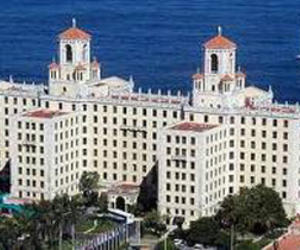Taking A "Model" Out For a Spin (Part III)
- Submitted by: manso
- Editorial Articles
- 10 / 30 / 2010

Behind the New Economic Measures in Cuba: Advancing the Revolution in the Concrete World Situation of Today. Genesis of the Cuban Economic Crisis
By Ike Nahem.It is certainly no secret that revolutionary Cuba has been in a permanent structural economic and financial crisis - within which concrete advances and setbacks have unfolded - since the late 1980s and early 1990s. The onset of this crisis - known in Cuba as the "Special Period" - was catalyzed by the collapse of the ruling governments in the former Soviet Union and its allied Eastern European states from 1989 to 1991.
Insofar as Cuba had carried out some 85% of its economic exchange with these governments, the so-called "socialist camp," the impact of what was in effect an overnight amputation of the overwhelming majority of its previous economic relationships was drastic and devastating for the Cuban economy and population. Almost instantly a dynamic of severe economic retraction unfolded that reached around 35%, perhaps over double that of what is referred to as the Great Depression in the United States. At one point the Cuban currency was so debased that the US dollar was the functional currency for the country.
It was taken for granted by Cuba's powerful enemies in Washington, its former ruling classes exiled in Miami and the US, the Latin American reactionary oligarchies, and even many sympathizers and friends of Cuba that the revolutionary government could not possibly survive such overwhelming material blows. Washington of course moved in for the kill. Under the first George Bush and then expanded under the Democratic William Clinton Administration, the US economic and political war against the island was intensified. The passage of the notorious Torricelli and Helms-Burton legislation attempted to implement a
de facto international economic blockade against the Cuban workers state.
Under these concrete conditions Cuba and its revolutionary government had no choice but to develop and forge economic and commercial relations and exchange within world capital markets and legal mechanisms utterly dominated by the advanced capitalist countries, and with capitalist states, private firms and enterprises, pursuing whatever openings it could in the face of US hostility.
Fidel Castro described what Cuba faced with the Special Period in a landmark speech at the University of Havana in November 2005, a speech which was the template for the extensive debates and discussions in Cuban society that culminated in the new economic policies now being implemented: "[We] had been left without oil overnight, with no raw materials, no food, no cleaning products, nothing.the country suffered a shattering blow when overnight [the Soviet Union] fell and we were left alone, all on our own, and we lost all the markets on which to sell our sugar and we stopped getting supplies, fuel, even the wood with which to give a Christian burial to our dead. And everyone thought: 'This will fall apart', and the idiots still believe that it is all going to fall apart here and that if it doesn't fall apart now it will fall apart later."
The Cuban working people, defending the revolution and social relations deeply rooted in their unity and consciousness, clawed their way to survival and a certain stability and progress through wrenching adaptations and flexibility. Most amazingly this was done without in the slightest compromising on fundamental revolutionary principles and in particular maintaining a revolutionary internationalist foreign policy based on solidarity.
Among the measures adopted by the Cuban government, then led by Fidel Castro, at the origins of the Special Period were great efforts to find and secure capital to rebuild the tourism industry and other economic projects, which were done in
partnership with various foreign capitalist firms. This large expansion of tourism - which involved huge investment in the construction and fitting of hotels and other accompanying tourism infrastructure - was successfully carried out and soon began to bring in significant amounts of so-called hard currencies, that is, the foreign exchange that was used to maintain, among other priorities,Cuba's excellent - and free - health care and education systems. Some private commercial activity, particularly in the sales of agricultural output, including through brokeraging, became legal and contributed to relative agricultural advances from a deep depression marked by a great scarcity of farm implements,machinery, fertilizer, and chemicals.
By the mid-1990s the Cuban economy as a whole began to revive as new economic partnerships developed. Among the most important were with China. Further crucial advances occurred as a result of Cuba's political and diplomatic campaigns in Latin America and the growing atmosphere of solidarity that made possible increased economic ties with Latin American and Caribbean countries. In particular the election of Hugo Chavez in Venezuela, registering a growing class-conscious militancy among Venezuelan working people, led to strong and growing economic ties between Cuba and Venezuela.
Following the mass mobilizations in Venezuela that defeated pro-imperialist coup attempts in 2002 and 2003, large numbers of Cuban doctors, other medical workers, and teachers volunteered for work in Venezuela leading to great advances in access to medical care and education for working people there. Venezuelan oil and energy exports and expertise were expanded to Cuba at favorable prices, a central factor in the stabilization of the Cuban economy and finances.
Ike Nahem is the coordinator of Cuba Solidarity New York (cubasolidarityny@...) a member of the National Network on Cuba, and a founder of the New York-New Jersey July 26 Coalition. Nahem is an Amtrak Locomotive Engineer and member of the Brotherhood of Locomotive Engineers and Trainmen, a division of the Teamsters Union. These are his personal political opinions.
Source: http://groups.yahoo.com/group/CubaNews/message/118659
Comments